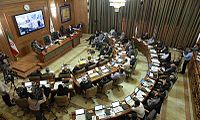City Council of Tehran
| Tehran Islamic City Council | |
|---|---|
 |
|
| Type | |
| Type | |
| Leadership | |
|
Chairman
|
Mehdi Chamran
Since September 3, 2014 |
|
Deputy Chairman
|
Morteza Talaie
Since September 3, 2013 |
| Structure | |
| Seats | 31 |
 |
|
|
Political groups
|
Majority (16)
|
| Elections | |
|
Last election
|
June 14, 2013 |
| Meeting place | |
 |
|
| City Council Building Behesht Street Tehran |
|
| Website | |
| Tehran City Council Website | |
The Islamic City Council of Tehran (Persian: شورای اسلامی شهر تهران) is the elected council that presides over the city of Tehran, elects the Mayor of Tehran, and budgets of the Municipality of Tehran.
The council is composed of fifteen members elected from single-member districts for four-year terms. The Chairman and the Deputy Chairman of the Council are chosen by the council at the first regular meeting in odd-numbered years.
It holds regular meetings on Sunday, Tuesday and Wednesday at 10 am (except on holidays or if decided by special resolution not to meet). The number of members was increased to the 31 in the 2013 local elections.
Persian Constitutional Revolution passed a law on local governance known as “Ghanoon-e Baladieh”. The second and third articles of the law, on “anjoman-e baladieh”, or the city council, provide a detailed outline on issues such as the role of the councils in the city, the members’ qualifications, the election process, and the requirements to be entitled to vote. Baladieh, or the modern municipality in Iran was established in 1910, to cope with the growing need for the transformation of Tehran’s city structures.
After the First World War, Reza Shah, the founder of the Pahlavi dynasty, immediately suspended the “Ghanoon-e Baladieh” of 1907 and the decentralized and autonomous city councils were replaced by centralist/sectoralist approaches of governance and planning.
...
Wikipedia
